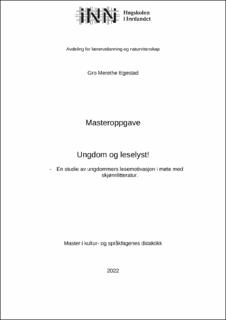| dc.contributor.advisor | | |
| dc.contributor.author | Egestad, Gro Merethe | |
| dc.date.accessioned | 2022-09-20T16:17:15Z | |
| dc.date.available | 2022-09-20T16:17:15Z | |
| dc.date.issued | 2022 | |
| dc.identifier | no.inn:inspera:111592165:30852062 | |
| dc.identifier.uri | https://hdl.handle.net/11250/3019714 | |
| dc.description.abstract | Sammendrag
Lesing er en kompleks øvelse, som krever både god lesekompetanse og lesemotivasjon. I denne oppgaven har jeg hatt som mål å finne ut hva som motiverer ungdommer til å lese skjønnlitterære tekster, samt se på ulike sider ved det å utvikle en god lesekompetanse. Jeg har også sett på norsklærerens betydning og hvordan norskundervisningen kan tilrettelegges for å bidra til økt leselyst. Oppgavens problemstilling ble formulert slik:
Hvilke refleksjoner gjør ungdom seg rundt egen lesemotivasjon og lesing av skjønnlitteratur på skolen, og hvordan kan norsklæreren legge til rette for å stimulere leselysten?
Gjennom fire elevintervjuer og intervju med en norsklærer, har jeg kommet frem til at elever ikke har den iboende leselysten som vi kanskje ønsker at de har. De må stimuleres og settes i gang med lesing, og det må settes av nok tid i undervisningen til leseaktiviteter. Elevene liker bøker som inneholder spenning, samt bøker som handler om virkelige hendelser og ekte personer. Det ser ut til at det har mindre betydning for elevene hvordan lesingen foregår på skolen, men de fleste uttrykker at de trives best med å lese selv. De forteller at det er lite læreren kan gjøre for å motivere dem, men at det er viktig med god tilgang på interessant og oppdatert litteratur. Det lærerbidraget de føler motiverer dem, er samtaler og spørsmål rundt tekstene som leses.
Jeg presenterer teorier fra blant andre Louise Rosenblatt (1995), Martha Nussbaum (2016), Åsmund Hennig (2011), Kåre Kverndokken (2013) og John T. Guthrie (1997/2008), og denne teorien underbygger elevinformantenes påstander. Jeg har også presentert forskning som viser at elever leser mindre skjønnlitteratur nå enn tidligere. Digitale medier har overtatt mye av tiden som tidligere ble brukt til lesing, og dette gjør at leseferdighetene blant norske ungdommer blir dårligere. Flere teoretikere jeg støtter meg på i oppgaven, trekker frem gode tips og råd til litteraturundervisningen i klasserommet. | |
| dc.description.abstract | Abstract
Reading is a complex skill, and it takes both reading competence and reading motivation to be a skilled reader. In this Master’s thesis my goal has been to study what motivates youths to read fictional texts, as well as different aspects in developing good reading competence. I have also looked into the Norwegian teacher’s importance and how Norwegian teaching can be facilitated to increase the pupil’s reading motivation. Therefore, I ask the following question:
What kind of reflections do young people make around own reading motivation and reading of fiction in school, and how can the Norwegian teacher facilitate the desire to read?
Through four interviews with pupils and a Norwegian teacher, I have found out that pupils do not have the inner desire to read as we may want them to have. They have to be stimulated for reading, and it has to be set a side enough time during lessons for reading activities. The pupils like exciting stories, and books that is based on real events and genuine people. It looks like it does not matter so much to the pupils how reading is done at school, but most pupils say that they like it best when they are reading on their own. They say that there are little the Norwegian teacher can do to motivate them, but that it is important to have good access to interesting and updated literature. The teacher contribution they feel motivates them, is conversations and asking questions about the texts they read.
I present theories by Louise Rosenblatt (1995), Martha Nussbaum (2016), Åsmund Hennig (2011), Kåre Kverndokken (2013) and John T. Guthrie (1997/2008), amongst others, and this theory substantiates the pupils claims. I have also presented earlier research that shows that pupils read less fiction now than before. Digital media has taken over much of the time earlier spent on reading, and this means that reading competence among Norwegian pupils deteriorate. Several of the theorists I rely on in this thesis, highlights good tips and advice for teaching literature in the classroom. | |
| dc.language | nob | |
| dc.publisher | Inland Norway University | |
| dc.title | Ungdom og leselyst!
- En studie av ungdommers lesemotivasjon i møte med skjønnlitteratur. | |
| dc.type | Master thesis | |
